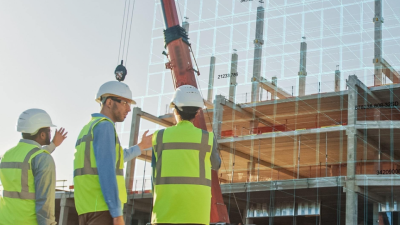
New technologies to improve health and safety performance
Discovering Safety joins forces with Safetytech Accelerator to build a Smarter Regulation Sandbox.
This page is approximately a 4 minute read
This page was published on

From improving air quality in cities to building affordable homes faster, creating better access to data can drive innovation in engineering and produce tangible results for a safer, healthier future. That’s the impact of Lloyd’s Register Foundation’s collaboration with the Open Data Institute (ODI) to create a Stimulus Fund. It’s supporting five new projects that will increase access to data and drive innovation in the engineering sector.
The Stimulus Fund aims to:
The five projects we’re funding demonstrate the breadth of impact of open data access. This includes safer flights, better response to incidents at sea, faster planning for homes on brownfield sites and creating a safer built environment. The projects bring public and private sector partners together to promote solutions to urgent problems.
Sir Nigel Shadbolt, Co-Founder and Chairman of the ODI, said: “Data about our physical infrastructure such as bridges, sewers, and electricity lines is a vital part of our national data infrastructure. It provides critical information about our environment that we can use to identify improvements and opportunities for better, safer, more efficient services. This initiative will look at where sharing and opening data would help the designers, operators and maintainers of our physical infrastructure to keep us safe.”
The initiative is in line with the Insight Report we published with our long-term partners the Royal Academy of Engineering in 2019, which highlighted the benefits of increasing access to data across the engineering sectors, to increase safety and drive innovation.
The Royal Academy is working closely with us on the data-sharing initiative, as one of its Fellows, Professor Martyn Thomas, CBE FREng, explains:
“We look forward to working with the Open Data Institute and the Lloyd’s Register Foundation on this important initiative. The safety of infrastructure and other engineered systems affects people in every country and many of the same methods, components and materials are used worldwide. Engineers have a professional duty to ensure that their work does not expose anyone to avoidable risks and the open sharing of data creates a good opportunity to improve safety – and greater safety is also good for business.”
The ‘Breathing Cities’ project has created a foundation for helping city planners in a COVID-19 world. This will be further explored through their new follow-on project – A Living Model for People and Place – which is funded by Innovate UK and supported by the University of Leeds VirtuoCity Centre for City Simulation, Leeds City Council and Newcastle-under-Lyme Borough Council.
The scenario analysis being prototyped should provide valuable insights into managing current, and anticipated future health risks posed by air pollution, as well as many other challenges faced by cities. It’s already seeing an impact from use of the ‘people in confined spaces’ scenarios developed as part of ‘Breathing Cities’ to support the response to COVID-19.
To find out more about the work the Foundation and the Open Data Institute are doing around increasing access to data to improve safety visit their website https://theodi.org/